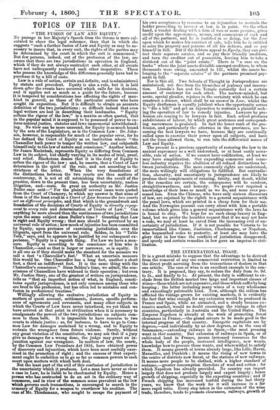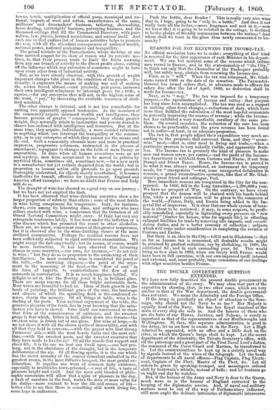THE INTERNATIONAL TOAST.
IT is a great mistake to suppose that the advantage to be derived from the removal of any one commercial restriction is limited to the direct profit accruing from the transactions of dealers in that one article. The ease of wine is an excellent example to the con- trary. It is proposed, they say, to reduce the duty from 5s. 9d. to 38., and finally to la. At present, the duty is sufficient to ex- clude from the British market two large and important classes of wines—those which are not expensive, and thosewhieh suffer by long keeping ; the latter including many wines of a very wholesome and exceedingly palateable kind. Now, although the ()Whim has afflicted the vintage grown for existing markets, it is evidently the fact that wine enough for any extension would be produced in France and Spain, while an animated, and a steady because ex- tensive market, would no doubt encourage the vintage in other countries, particularly in Australia and the United States. The Emperor Napoleon is already at the work of promoting forest clearances in France,—the grand arrears to be made good in the internal progress of that country. Energetic capitalists are by degrees,—and individually by no slow degrees, as in the case of Salamanca,—extending railways in Soma—the most pressing want in that country. But extension of railways in Spain, or of cultivated land in France, means increased resources for the whole body of the people, increased intelligence, new wants, knowledge how to procure those wants, and wherewithal to satisfy them. It means growth of towns already large, like Lille, Havre, Marseilles, and Dunkirk ; it means the rising of new towns in the centre of districts now forest, at the stations of new railways. It means more people to be clothed, with a higher standard of costume,—greater consumption therefore of wool and cotton, for which Napoleon has already provided. No country can import largely that does not produce largely and export largely; hence growth of shipping, especially in the exporting countries ; and if French shipping has increased tenfold during the last thirty years, we know that the work for it will increase in a far more rapid ratio. Every step taken in the extension of the wine trade, therefore, tends to promote clearances, railways, growth of
towns, hotels, multiplication of official posts, municipal and na- tional, imports of wool and cotton, manufactures of the same, milliners' and dressmakers' business, tailoring, shoemaking, horse dealing, cartwrights' business, purveying business, and the thousand callings that fill the Commercial Directory, with jour- nalism, law, physic, learned associations, and science itself. And each one in that endless list of human activities helps to promote the rest, with all the attendant consequences of national wealth, national power, national contentment and tranquillity. The grand mistake of the Protectionists, whose doctrine at one time merited respect for its show of reason and its patriotic mo- tives, is, that their process tends to limit the fruits accruing from any one branch of activity to the direct profits alone, cutting off the influence which any extension of commerce ought to have upon every other form of industrial activity. But, as we have already observed, with this growth of wealth important changes take place in the condition of the people. Na- tionally, it augments the means of making war and of making the nation feared abroad,—and precisely, purl passu, increases their own intelligent reluctance to interrupt peace for a trifle, a caprice,—for any enterprise that will not, in the highest sense of the word, "pay," by increasing the available resources of civil- ized mankind.
The other change is internal, and is not less remarkable for uniting two apparently opposed tendencies. As the members of the community acquire increased wealth and intelligence, they become persons of greater "consequence," they obtain greater weight, they naturally attain to immunities and powers denied to classes less endowed with intelligence and resources. But at the same time, they acquire, individually, a more decided reluctance to anything which can interrupt the tranquillity of the commu- nity, or to any enterprise of which they cannot see the means and the end. Such a community abounds more and more in practical improvers, progressive reformers, instructed in the process of amendment, repugnant to changes on the faith of mere theory or superstition. In days when all human avocations were an art and mystery, men were accustomed to be moved in politics by mythical ideas, sometimes old, sometimes new,—for a new myth is a manufacture not yet entirely departed from the world ; but in proportion as human action only pretends to go upon grounds thoroughly understood, for objects clearly ascertained, it becomes ineffective for tumult, effective for improvement. England and America afford examples ; we have no doubt that France and Italy will do so.
The draught of wine has cheered us a good way on our journey ; but we have not yet emptied the flask. It has been observed that wine-drinking countries show a far larger proportion of sobriety than others ; some of the most fertile in wine being conspicuous for temperance. Italy, for instance, shows, even among its labouring class, and cottagers who have cellars stocked with wine, a temperance that the Grandest of all Grand Teetotal Committees might envy. If Italy has seen any retrograde tendencies lately, it has been under the infliction of a vine disease which has promoted the resort to other alcoholics. There are, we know, concurrent causes of this greater temperance, but it is observed also in the wine-drinking classes of the more civilized communities. Perhaps the cardinal reasons have not been sufficiently subjected to rigid continuous examination. We might accept the fact empirically; but its causes, of course, would be more instructive. It has been observed that labouring classes in some countries,—our own, for instance,—" do not take to wine ; " but they do so in proportion to the awakening of their intelligence. In most countries, wine is considered the jewel of the table,—the crowning elegance,—the point of the argu- ment in the reasoning of the feast,—the "flow of soul" in the form of imports, to counterbalance the flow of soul outwards in conversation. It is so much happiness bottled. We delight to set it, like the flowing jewel it is, in brilliant glass. There are many reasons for all these bright undeniable facts. Most wines are beautiful to look at. Ideas of their growth in the lands of painting, the brilliant grace of the vine, the landscape and climate of which the sparkling fluid is the condensed es- sence, charm the memory. Of all things at table, wine is the darling of the poets. Your national enjoyment of the table, the generous pleasure of the feast, lies in your knowing that the satis- faction you have is shared. Love itself can condescend to share that form of the consciousness of existence, and the sweetest grape is that which, bitten in half, slides down two throats—the sweetest wine is drank out of one glass. But wine at large,—do we not share it with all the choice spirits of immortality, and with all that they held in converse,—with the gayest wits that throng Parnassus' side,—with the most heroic bards and the most sub- lime,—with the sweetest poets, and the sweetest creatures that they have made to live for us? Of all the viands that support and cheer life, it is the one we best can dwell upon,—can best pro- long, not in the abundance of the draught, but in the temperate deliberation of the sip. Of all flowing spirits, it is the one which has the nicest economy of the coarser stimulant embodied in the greatest aroma, in the most diffusive bouquet, the most genial ex- hilaration. It supplies one want of common daily existence, especially to multitudes town-prisoned,—a zest of life, a taste of pleasure bright and vivid. And the most cold blooded of philo- sophic economists will allow that a spice of pleasure in the day, a dash of sunshine in the food, makes the man of more value for his duties—more content to bear the ills and crosses of life— better able to see that there is something still worth living for, some hope in endeavour. Push the bottle, dear Reader ! This is really very nice wine that is, I hope, going to be "only is. a bottle." And does it not really taste all the better,—more fragrance and zest in it,—now we know that it is going to be relished in the cottage, is destined to be the pledge of friendly communion between the nations ? And whom shall we toast in the glass thus newly consecrated to hu- manity?



























 Previous page
Previous page